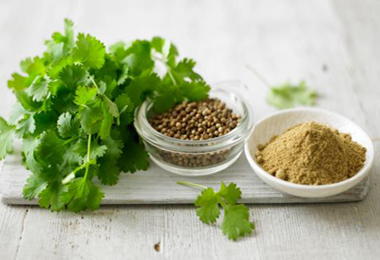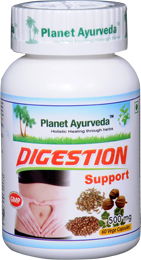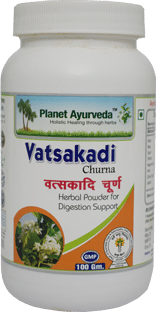Coriander (Coriandrum Sativum) - Uses, Benefits, Properties, Dosage

Coriander plant
Dhaniya, Dhanyaka or Coriander botanical name is Coriandrum sativum. Corinder plant grows annually but according to conditions, can grow in summer or in winter. The plant can grow up to 2 feet and can spread around up to 9 inches. Corinder roots are pale brown color with tap root system. Corinder stems are sympoidal and have monochasial branches. Every branch of the Corinder plant shows effect of inflorescence. Color of the stem is generally green, but turns to red to violet due to the season of flowers. Corinder leaves are of alternate type and gather in the form of rosette. This plant is a kind of diversifolious. First, the blade shapes are either have three lobes or tripinnatifid. On the other hand, the leaves of the nodes are pinnatifid. The compound shows inflorescence is known as umbel. Flowering of the plants starts with first umbel. In the every umbellet, the peripheral flower is the first one which proliferates very first. The flowers are of protandrous type. The color of the flowers is pink or sometimes white. The central flowers are sterile in nature. This feature can be seen after fruit becomes fully mature. The petals of the flower are five in number. The peripheral flowers are somewhat of asymmetric type and central ones are in circular shape.
What is Coriander
Dhanyaka is mentioned in the various ancient scriptures. This is the one of the main ingredient in the kitchen of India. The scientific name of dhanyaka is Coriandrum sativum, generally known as dhaniya or coriander. It is also famous with the name of cilantro seeds. The word dhanyaka itself, is known as plant as well as fruit.
This plant belongs to the family Umbelliferae. Coriande is ready for harvesting, when it turns to brown in colour and the leaves become dry. It comes from the Mediterranean region. It can be bitter or sweet in taste as fresh plant has sweet taste and the dried version of this plant is bitter in taste.
This plant has very good image as helpful in treating various ailments. It is known for its carminative, stimulant, aromatic, diuretic, anti-diabetic, antioxidant,sedative, anti-microbial, anti-convulsant and anthelmintic properties. So used to treat diseases like blood sugar disorders, high cholesterol levels, swellings, small pox, diarrhea, digestion, menstrual disorders, Mouth ulcers, anemia, eye care, conjunctivitis, skin disorders etc.
The plant has vital chemical components that make the plant capable to fight against body ailments. Major chemicals that actively play role in combating diseases are essential oil and fatty oil. This plant contains water, fat, crude proteins, starch, fibers, sugars, fatty acids and essential oils.
Major components of essential oil are linalool, a- pinene, y- terpene, camphor, graniol and Geranylacetate. The other components such as camphene, b- pinene, myrcene, limonene, dipentene etc present in lower amounts in the essential oil. The fatty oil contains petroselinic acid, lenoileic acid, palmitic and oleic acids as their main ingredients. Myristic, stearic and vaccenic acids are present in lower amount.
Classification
- Kingdom - Plantae
- Subkingdom - Tracheobionta
- Superdivision - Spermatophyta
- Division - Magnoliophyta
- Class - Magnoliopsida
- Subclass - Rosidae
- Order - Apiales
- Family - Apiaceae
- Genus - Coriandrum
- Species - sativum
Habitat
Dhanyaka is widely distributed in Italy, central, Eastern Europe and Mediterranean areas like in Egypt and Morocco. It is also widely cultivated in Bangladesh, China, England and India. Ukraine is one of the major essential oil production country. In India, it is found especially in Rajasthan, Tamil Nadu, Punjab, Madhya Pradesh, Bihar, Maharashtra and Karnataka.
Names of Coriander
- Latin name - Coriandrum sativum
- Sanskrit name – dhanyaka, Dhanika, Dhania Vitunnaka
- Hindi name – dhania, dhanya
- English name – coriander, Chinese parsley, collender
- Bengali name - Dhane, Dhania
- Marathi name - Dhaue, Kothimbir
- Kashmiri name - Dhaniwal, Dhanawal
- Punjabi name – Dhania
- Tamil name - Kottamalli, Viral dhania
- Gujarati name – Dhana
- Telagu name - Dhaniyalu
- Urdu name - Kishneez
- Portugese name - Coentro
- Italian name – Coriandolo
- German name – Koriander
- Japanese name – Koendoro
- Arab name - Kuzbara, kuzbura
- Armenian name – Chamem
- Chinese name - Yuan sui, husui
Ayurvedic Properties of Coriander
| Hindi / Sanskrit | English | ||
| Rasa | Fresh –
Madhur Dry - Tikta, Kashaya |
Taste | Fresh - Sweet Dry - Astringent, Bitter |
| Guna | Laghu, Snigdha | Physical Property | Light, Unctuous |
| Virya | Dry - Ushna Fresh - Sheet |
Potency | Dry - Hot Fresh - Cold |
| Vipaka | Madhura | Metabolic Property (After Digestion) | Sweet |
Coriander Effect on Doshas
Coriander balances and controls all three doshas pitta, kapha and vata.
Classical cetogrisation
| Charak Samhita | Vagbhata | Maharsi Caraka | Sushrut Samhita |
|
|
|
|
Ancient Verse about Dhaniya

Bhavprakash nighantu edition of 1998: verse 86-88, page no-33-35.
It states the names and properties of dhaniya. It is known as dhanyaka, dhanak, dhanya, dhana, dhanyak, kunti, dhenuka, chhtra, Kusutumbru and Vitunnaka.
It is astringent in taste, unctuous, diuretic, light, bitter and pungent in taste. It has hot potency, promotes digestive fire and manages all kind of fever. This pacifies all three doshas, excessive thirst, burning sensation in the body. It controls thinness, cough and respiratory diseases.
Fresh dhaniya is same in all prospective but has sweet in taste and pacify specially pitta.
References
The Bhavprakash nighantu with elaborated Hindi commentary by Padmashri prof. K.C. Chunekar, edited by Dr. G.S. Pandey: edition of 1998; verse 86-88, page no- 33-35.
Practical Uses of Coriander
- The Dhaniya Plant is full of minerals as phosphorous, vitamins like A and C, antioxidants. These are found in its essential oil and the beta carotene is also there in its leaves. All the chemical constituents are helpful to cure vision disorders and stress in eyes.
- This plant has various chemicals and enzymes help to cure indigestion, peristaltic movements and anorexia.
- Plant is used to treat seasonal allergies, allergy due to plants, insects or food, hay fever and more.
- Cineole and other acids in essential oil helps to cure skin inflammation. It also shows effect on dry skin, eczema and skin fungal infections.
- Acids present in essential oil and vitamins in the plant reduce the level of LDL in heart arteries and veins and cholesterol level which further can lead to serious ailments like heart attacks and atherosclerosis. It is also helpful in raising the levels of HDL.
- Components of essential oils help to treat mouth ulcers.
- As it is a great source of calcium. So helps in bone regrowth.
- It controls proper stimulation of endocrine secretions, so help to maintain proper menstrual cycles and also lowers the pain.
- This stimulates the proper level of insulin in the blood due to which diabetes and blood sugar levels can be controlled.
Coriander Parts used
Fruits, Whole plant, Leaves
Ayurvedic Products from Dhaniya by Planet Ayurveda
Planet Ayurveda makes use of dhanyaka in their herbal formulations such as Digestion Support and Vatsakadi Churna.
1. DIGESTION SUPPORT
It is the formulation to manage digestion related ailments. It controls proper level and timing of the juices of liver, pancreas and intestines, cures acidity and gas problems of abdomen and relieves the abdomen pain. This herbal formulation is mixture of various herbs and one of them is dhanyaka.
2. VATSAKADI CHURNA
This churna is blend of various herbs like dhanyaka, one of the main ingredient of churna. This churna helps to manage irritable bowel syndrome, diarrhea, acidity and gastritis.





